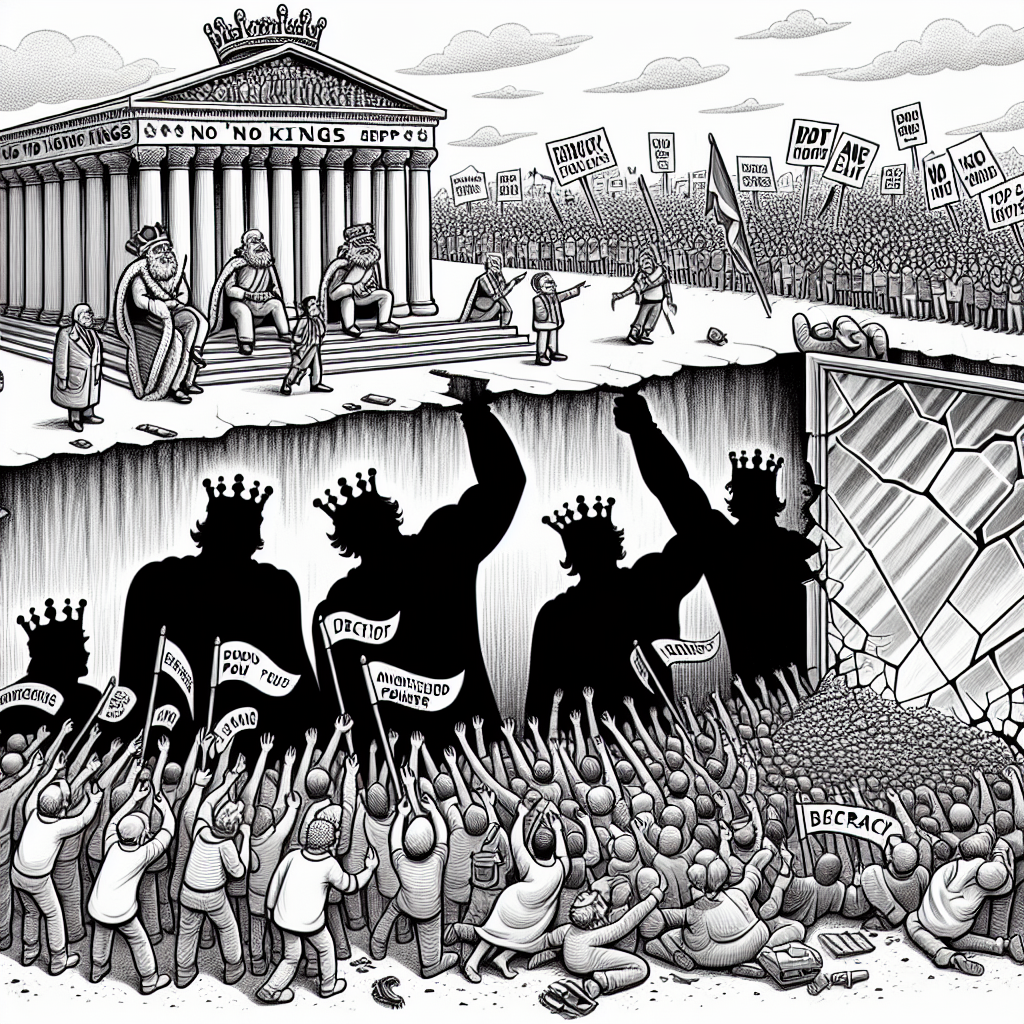No Kings: The Illusion of Power in a World Already Void of Meaning

In a country seemingly shackled by its own contradictions, millions are gathering not just in protest, but in defiant assertion that no one should wield unquestioned power. These "No Kings" protests, sweeping across the United States, are pitched as a stand against authoritarianism—against militarization and policies perceived as a creeping dictatorship under the guise of democracy. Yet beneath the surface of this nationwide movement lies a more unsettling truth about power, control, and the futility of resistance when the entire structure feels hollow, built on sand rather than stone.
The “No Kings” movement paints a picture of an America awakening to defend its democratic norms, to resist the glorification of leadership that borders on monarchy, to reject the deployment of National Guard troops within its own cities, and to demand a reaffirmation of free speech and civil liberties. These are righteous ideals, pleaded earnestly and loudly in streets across every state. But one cannot help but wonder: what does it mean to truly "defend democracy" when the foundations of that system seem rotted by ambition, greed, and spectacle?
To participate in these protests is to believe that the system, lugubrious and broken as it is, can be preserved or restored through collective action and moral resolve. The movement holds fast to nonviolence, a beacon of hope that brutality will not beget brutality; an idealistic choice in a world growing increasingly cynical about the outcomes of peaceful resistance. Yet, there is a grim poetry in this—a desire to wrestle light from darkness without being consumed by it, to shout meaning into the void expecting an echo.
This very insistence on nonviolence and democratic adherence feels like the last flicker of a dying candle in a cave eclipsed by shadows. The government's deployment of armed forces to cities like Chicago and Los Angeles, the ever-tightening immigration crackdowns, and the federal shutdown all speak to deeper fractures beyond one presidency or one protest. They point toward a nation that is unraveling not just politically, but existentially—where governance becomes theater and policy a fleeting mirage.
The “No Kings” slogan itself is drenched in dramatic irony. It implies that the presidency should not be crowned as a monarchy, that no single figure should dominate the narrative of a free people. Yet in a country flooded with protests, rhetoric, and counter-rhetoric, what seems uncontested is the banality of spectacle. Power is distributed not just through institutions but through endless performance—a political pantomime where giants clash while the masses flit in shadows below. American democracy, then, is dazzled by its reflection in a cracked mirror, desperate to believe in what it can barely recognize.
To speak of defending free speech and democratic norms as if they are still firmly anchored feels like clutching at fog. The very notion of free speech is tangled with who has the platform, who gets amplified, and who is silenced beneath the noise. The protestors demand rights, yet these rights waver under the constant threat of militarization, systemic displacement, and a political machine that elevates spectacles over solutions. In such an environment, protests are both vital and Sisyphean—they are necessary acts of defiance, yet the roots of the problems run deeper than any rally or chant.
The ironies compound—no kings, yes, but perhaps no true democracy either. Leaders wield influence not as benevolent stewards but as actors feeding a narrative of crisis to justify measures that consolidate power. The federal shutdown is not just a political impasse but a symptom of systemic dysfunction, a structural silence where governance fails more often than it succeeds. The deployment of National Guard troops to quell unrest invokes specters of a state increasingly fearful of its own constituents, framing citizens as threats rather than partners.
The "No Kings" protests thus become a theater of hope amid an epidemic of despair. They are a plea for sanity and justice, a flickering testament to the enduring human spirit's need to scream against silence. Yet the darkness that creeps beneath the slogans and peaceful gatherings is a reminder that fighting for ideals within a fractured system can sometimes feel like murmuring poetry into a ravenous void. The passion and poetry of protest echo, but the silence that follows is heavy, omnipresent.
Ultimately, these rallies expose the tragic poetry of our times: the desperate yearning for power that serves the people, in a reality where power has often been something else entirely—a shadow looming over democracy’s corpse, a king with no crown, a throne built on shifting sands and empty words. The protests throw their voices into the storm, resisting the darkness, even as the darkness seems to swallow everything whole.
So we watch, with both hope and heartbreak, the millions rise on October 18th. For in their rise lies the fleeting promise that from chaos, some kind of order may yet bloom. But for those attuned to the undercurrent of desolation that runs through everything, this moment also feels like a dirge. No kings, no saviors — only the raw, dark need to reclaim meaning from the void.

